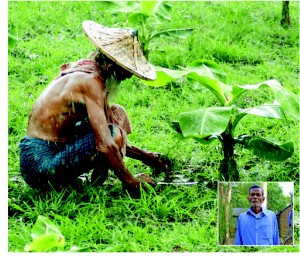
Farm labour has reduced remarkably
Anwar Ali
 |
Photo: shafiqul Islam Kajol/Driknews |
SIXTY five years old Aminul Islam of Godagari upazila in Rajshahi witnessed radical changes in agriculture of Barind tract in his 45 years of farming. But one thing, he said, has never change is the attitude of governments toward farmers.
“The then governments in late 60s did not look after farmers at all; all other governments later seldom paid heed to us. None takes total care of farmers even now”, he said during an interview with The Daily Star.
He said he has cultivating tomato for the last three years as it is being widely produced in Barind area for last one decade. Like hundreds of others, he counted loss in tomato for bad seeds this year. “But it is not any regular phenomenon. Seed dealers taking opportunity of farmers' enthusiasm created artificial crisis and sold adulterated seeds”.
“Who will now pay for our losses? If the government would have taken proper care for agriculture and farmers, none would dare playing with farmers' fate”, he said sitting at courtyard of his home at Mohishalbari Sagorpara village.
“We had not always so many kinds of crop seeds that are abundantly on sale now”, he said informing his involvement with agriculture since his childhood and he has now the memory from his age of 20 in 1965.
Farmers used to prepare seeds for themselves before, he said. “After harvest in previous days, we used to separate best quality paddy for preparing seeds for the next year's cultivation.”
Barind farmers had no other choices but cultivating one crop Aman as there was no arrangement for water even before mid-90s, he went on to say. “We depended solely on water from the sky for Aman. Some had ponds nearby. Our lands remained fallow for rest of the year and farmers passed idle time taking cattle to graze on harvested crop fields and watching over those sitting under a tree”.
In an age of machines, we are getting more than three crops a year as researchers developed and introduced deep tube-wells that are extracting ground water for our lands; power tillers, motorised winnowers and many other tools came, he said.
“We hardly expected 10 to 12 maunds of paddy from a bigha earlier and in case of scanty rain, the output did not cross three to four maunds. Now we have at least 10 deep-tube-wells in our village. And this year, I already reaped 18 maunds of Parija paddy from 1.5 bigha, then I cultivated tomato. After this I will sow Irri expecting at least 30 maunds of paddy from a bigha”.
Other farmers are also cultivating wheat, mustard, potato, and vegetables, he said.
We did not use chemical fertilisers before, but now there is no end to chemical fertilisers and pesticides. Fertiliser made from cow dung was generally used beforehand.
Aminul wondered that his children, who never complained before if he was unable to manage rice for them on any morning meal, are now becoming dissatisfied easily. “Perhaps, today's rice does not have the strength (nutrition values) of previous days when we seldom used any chemical fertiliser”.
Farm labour has also reduced remarkably as cow driven ploughs have been replaced by power tillers in many places, he said.
“Cultivation on 14 bighas of land now takes less than 14 hours. But we could hardly manage three times cultivation on one bigha of land in even a day. Those who had strong cows, could manage two to 2.5 bighas a day”. In some fields, farmers who had weak cattle used to draw the ploughs themselves.
“Now prices of ploughing cattle have gone beyond our reach. I sold two of my ploughing animals finding them no more of use in agriculture”.
Aminul inherited 1.5 bighas of land with which he hardly able to run his family of eight members. “With increase of technology in agriculture, farm jobs have also increased. I had to sell labour to other farms in years of deficit”, he said.
The writer is Rajshahi Correspondent, The Daily Star.